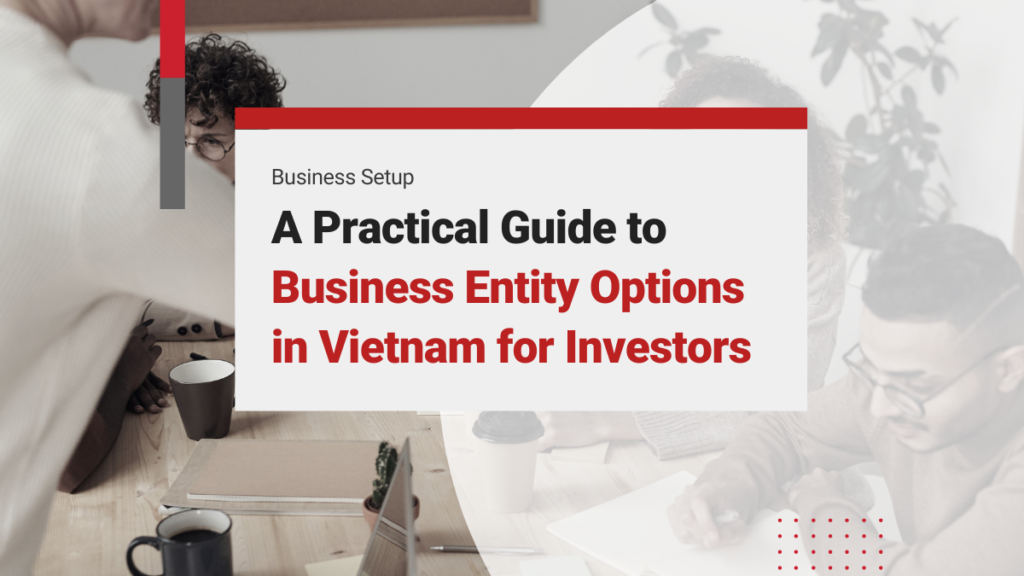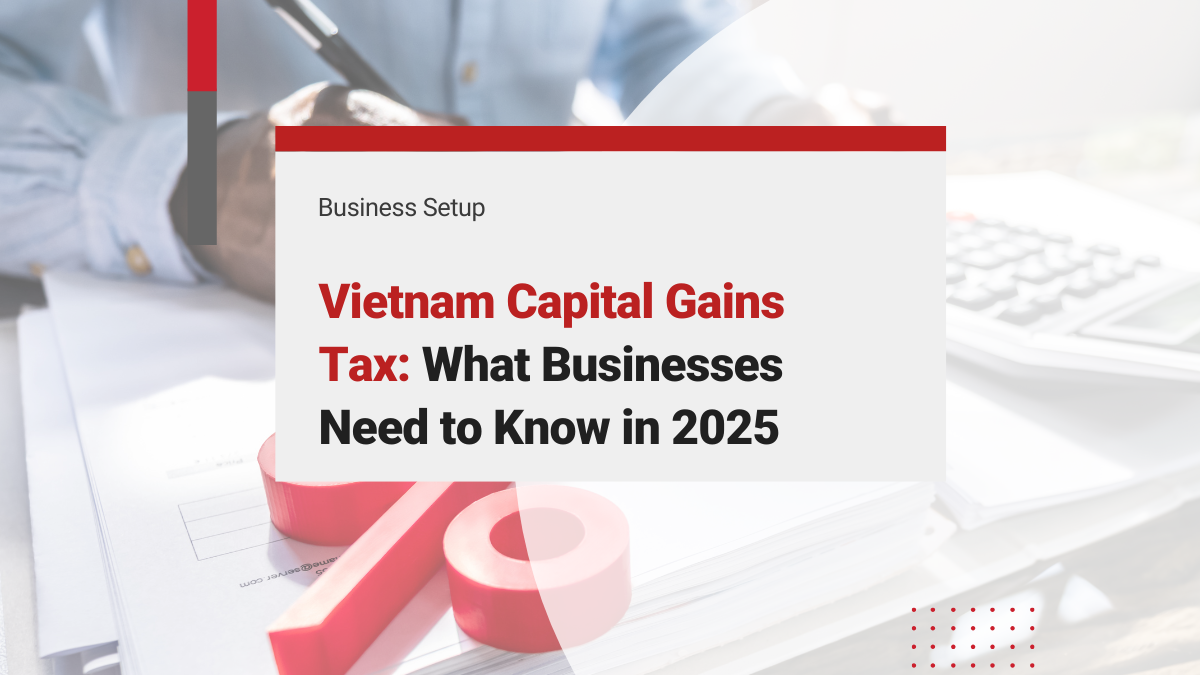Vietnam’s economy continues to demonstrate remarkable resilience and growth, with foreign direct investment (FDI) reaching $21.51 billion in the first half of 2025, marking a 32.6% increase compared to the same period in 2024. This positions Vietnam as one of Southeast Asia’s most attractive destinations for foreign investment, with the manufacturing and processing sector leading with nearly $12 billion in investments, accounting for 56.5% of total registered capital. As more investors seek long-term growth in Southeast Asia, many are exploring company formation in Vietnam as a strategic move to capitalize on the country’s economic momentum. In this guide, we break down the different types of business entities available and explore essential cultural factors to help ensure a successful market entry.
Vietnam continues to attract significant foreign investment, with nearly 111,800 newly established and reactivated enterprises in the first five months of 2025, reflecting an 11.3% year-on-year increase. The country has implemented major regulatory reforms in 2025, including the Amended Law on Enterprises effective July 1, 2025, which introduces beneficial ownership disclosure requirements and enhanced corporate transparency measures. Vietnam is a country with a rich cultural heritage and a rapidly growing economy, offering numerous business opportunities. For investors looking to start a business in Vietnam, the six primary types of business entities are:
- Limited Liability Company (LLC)
- Joint Stock Company (JSC)
- Representative Office (RO)
- Branch Office (BO)
- Joint Venture
- Public Private Partnership (PPP)
Limited Liability Company (LLC)
The Limited Liability Company (LLC) is a primary business entity in Vietnam, favored by local and foreign investors for its simplicity and flexibility. LLCs come in two categories: Single Member LLCs and Multiple Member LLCs. These entities are particularly attractive due to their flexibility in capital requirements, as Vietnam currently has no set minimum capital requirement for most business sectors, though the licensing authority typically accepts USD 10,000 as sufficient for covering business expenses and the limited liability for their members. Members of an LLC are only liable for the company’s debts, making it a safer option for investors.
Under the new regulations effective July 1, 2025, all companies must register an e-ID Vietnam account (organizational digital identity) to conduct online administrative procedures with authorities. The registered charter capital must be paid in full within 90 days from the date of company registration.
An LLC’s management structure includes a Members’ Council, a chairman, and a general director. Larger companies may also have a controller or board of supervisors, ensuring well-organized operations and streamlined decision-making. As the highest decision-making body, the Members’ Council plays a crucial role in governance.
Read More: Limited Liability Company (LLC) in Vietnam: The Last Guide You’ll Ever Need
Single Member Limited Liability Company
A Single Member Limited Liability Company (LLC) in Vietnam is a business owned by a single organization or individual, providing limited liability protection to the owner. The owner must contribute the required assets within 90 days of establishment, ensuring that the business is adequately capitalized from the outset. This type of LLC appeals for its simplicity, allowing the sole owner full control over decisions.
Multiple Member Limited Liability Company
A Multiple Member LLC requires 2 to 50 members, suitable for businesses that wish to include multiple stakeholders without issuing shares. Members must contribute their capital within 90 days of the company’s establishment. Unlike Joint Stock Companies, Multiple Member LLCs cannot issue shares but can issue bonds to raise capital, combining limited liability benefits with the flexibility of having multiple contributors.
Read Related: Venture Capital for Small and Medium Enterprises in Vietnam: Business Size of Companies
Joint Stock Company (JSC)
A Joint Stock Company (JSC) in Vietnam is ideal for businesses aiming to mobilize substantial capital and stock exchange listing. This type of entity can have an unlimited number of shareholders, which is liable for the company’s debts. Establishing a JSC requires a minimum of three shareholders, and the charter capital is divided into shares, providing flexibility in capital mobilization.
Under the Amended Law on Enterprises effective July 1, 2025, JSCs face new regulations regarding beneficial ownership disclosure and enhanced corporate governance requirements. The law introduces a maximum debt-to-equity ratio of 5:1 for non-public companies issuing private bonds, with exemptions for state-owned enterprises and regulated entities.
A key advantage of a JSC is its ability to issue shares, enabling more effective capital raising than other business entities. This capability is particularly beneficial for large-scale enterprises aiming for rapid expansion and public listing. The limited liability feature also makes JSC attractive to investors who want to minimize their financial risk while participating in the company’s growth.
Read More: Seamlessly Navigate Joint-Stock Company Formation in Vietnam
Founding Shareholders
Founding shareholders are essential to establishing and managing a Joint Stock Company (JSC), providing initial capital, and overseeing corporate governance. They make strategic decisions, influence the company’s direction, and maintain contacts with regulatory authorities.
Under the new beneficial ownership requirements, founding shareholders must disclose information about beneficial owners (individuals owning 25% or more of charter capital or having control rights) to the business registration authority at the time of registering the enterprise and within 10 days from any change to such information.
Founding shareholders also have specific responsibilities, such as ensuring compliance with legal regulations and representing the shareholders’ interests throughout the company’s formation and operation. Their strategic insight and governance are vital for the effective management and growth of a JSC.
Investing in Vietnam? See InCorp’s Company Formation Services for Foreign Entities
Management Structure
The management structure of a JSC typically includes a General Meeting of Shareholders, a Board of Directors, and a Director General. The General Meeting of Shareholders makes significant decisions for the JSC, such as approving financial statements, electing the Board of Directors who oversees company management, and ensuring strategic goals are met.
The Director General, who reports directly to the Board of Directors, is responsible for the day-to-day operations of the JSC. JSCs can operate under different organizational models based on the number of shareholders and the presence of independent board members, providing flexibility in their management structure.
This robust framework ensures that the company’s operations are efficient and that there is a clear separation of powers and responsibilities among the various governing bodies.
Read More: An Extensive Guide to Industry Capital & Deposit Requirements in Vietnam
Partnership Company
In Vietnam, a Partnership Company is established with at least two general partners sharing responsibilities and having unlimited liability for company obligations. This business entity requires an Enterprise Registration Certificate (ERC) for legal status, ensuring compliance with regulatory requirements. Partnership Companies are ideal for businesses that rely on the expertise and active participation of their partners in the management and operation of the company.
The company registration process in Vietnam typically takes 5-8 weeks for partnerships, with the Investment Registration Certificate (IRC) requiring 4-6 weeks and the Business Registration Certificate (BRC) taking 1-2 weeks.
Partnership Companies can also include capital-contributing partners liable for company debts up to their investment amount. This dual structure combines active management and passive investment, offering flexibility in business operations and funding.
Distinct roles and liabilities of general and capital-contributing partners make Partnership Companies versatile for various ventures.
Read More: Partnership Company in Vietnam: Definitions, Distinctions, and Registration Guide for Foreigners
General Partners
General partners in a partnership have unlimited liability for all company debts and obligations. This liability extends to all their assets, making their role critical in company management and operation. General partners are crucial in decision-making and overseeing daily activities, ensuring smooth functioning and legal compliance.
Capital-Contributing Partners
Capital-contributing partners provide financial resources and share profits, with liability limited to their capital contributed. Unlike general partners, they do not manage daily operations and are not liable for debts beyond their investment capital. This setup lets them benefit from the partnership’s success without being involved in operations.
Representative Office
A Representative Office (RO) is often the initial method for foreign companies entering the Vietnamese market. These offices help foreign businesses establish a presence and understand the local market by facilitating communication and building relationships. However, a Representative Office cannot engage in direct business transactions or generate income in Vietnam.
The setup time for a Representative Office is typically 4-6 weeks, making it a faster option compared to other business entities. Annual license fees for representative offices are VND 1,000,000 per year as of 2025.
This arrangement lets foreign companies explore the Vietnamese market without significant financial commitment or risk.
Read More: Effortlessly Establishment of a Representative Office in Vietnam
Branch Office
Branch Offices offer another way for foreign businesses to establish a presence in Vietnam. Unlike Representative Offices, Branch Offices can engage in various business activities, including industrial production, trading, and providing services. This makes them a more versatile option for companies looking to conduct business activities directly in Vietnam. However, a branch is dependent on its parent enterprise and must ensure that its business lines are consistent with those of the parent company.
Branch Offices are subject to the same annual license fee of VND 1,000,000 per year as representative offices. The registration process typically takes 5-8 weeks, similar to other business entities.
Branch Offices can issue VAT invoices independently, crucial for conducting business in Vietnam. This ability allows them to operate more freely and efficiently within the local market. The legal and operational flexibility of Branch Offices makes them an attractive option for foreign companies looking to expand their business activities in Vietnam.
Read More: Comprehensive Guide for Setting Up a Branch Office in Vietnam
Business Cooperation Contract (BCC)
A Business Cooperation Contract (BCC) allows foreign investors to collaborate with Vietnamese partners without creating a new legal entity. This flexible arrangement can be tailored to suit the needs of both parties in specific business activities. By entering a BCC, parties can pool resources and expertise for joint ventures and investment projects.
BCCs benefit investors looking to minimize financial risk while accessing local market knowledge and networks. These contracts define the roles, responsibilities, and profit-sharing arrangements between the parties. This structure ensures alignment in objectives and effective collaboration to achieve business goals.
BCCs offer flexibility and collaboration opportunities but come with certain legal implications. Investors in a BCC have unlimited liability for debts incurred under the contract. Both foreign and local partners must carefully consider potential risks and liabilities before entering such an agreement.
Drafting a comprehensive contract that addresses all legal responsibilities and safeguards interests is essential.
Public Private Partnership (PPP)
Public Private Partnerships (PPPs) are increasingly popular in Vietnam, especially for infrastructure and public service projects. This model involves a contractual agreement between government authorities and private companies to develop and operate infrastructure projects. The PPP Law, enacted in 2020 and effective in 2021, provides a stable regulatory framework to support collaborations and attract private investment.
Vietnam’s infrastructure investment needs have grown significantly, with the government increasing its 2025 infrastructure spending target from 6% to 7% of GDP, representing approximately $36 billion in planned spending. The government has also introduced special incentives for PPP projects in science, technology, and innovation sectors, with the state contributing up to 70% of total project investment.
PPPs are crucial for meeting Vietnam’s infrastructure needs, projected to require over US$600 billion by 2024. The Global Infrastructure Outlook estimates that Vietnam needs nearly $600 billion in infrastructure investment through 2040, with a projected funding gap of $100 billion. Vietnam plans to mobilize 620 trillion VND ($25.2 billion) in investment for infrastructure development in 2025, with priority given to transport, power, and information technology infrastructure. Key sectors for PPP investments include transportation, utilities, irrigation, and healthcare. These partnerships enhance public service quality and create opportunities for private investors in large-scale, impactful projects.
Types of PPP Contracts
Vietnam recognizes seven types of PPP contracts, including Build-Operate-Transfer (BOT) and Build-Transfer-Operate (BTO) models. These contracts are essential for infrastructure development, enabling government-private sector collaboration to finance, build, and operate public projects.
New regulations effective July 1, 2025, introduce special incentives for PPP projects in science, technology, and innovation, with actual R&D expenditure calculated at double (200%) when determining deductible expenses for corporate income tax purposes.
Investment Sectors
Key sectors for PPP investments in Vietnam include transportation, power, and information technology infrastructure. The government has approved an $8 billion Lao Cai-Hanoi-Hai Phong railway project and a $67 billion high-speed rail line spanning the length of the country. The Ministry of Construction has also proposed a $5.8 billion plan to expand 18 sections of the Eastern North-South Expressway using the PPP model. These sectors are critical for the country’s development and offer significant opportunities for domestic and international investors.
Despite a robust legal framework, PPP investment projects can face implementation challenges, making thorough market research and due diligence crucial for investors.
Still considering these types of businesses? Check out the full Comparison Table between Company Types Based on Legal Structure
Key Positions and Responsibilities
In any Vietnamese business entity, key roles like the legal representative, directors, and managers are crucial for the company’s success. The legal representative ensures the company complies with Vietnamese laws and regulations, acting as the official face in legal and financial matters. Directors and managers handle day-to-day management and implementation of company policies, ensuring smooth and efficient operations.
Under the Amended Law on Enterprises effective July 1, 2025, civil servants and public employees are explicitly prohibited from establishing, contributing capital to, or managing enterprises, with exceptions permitted only for cases aligned with laws governing science, technology, innovation, and national digital transformation.
General partners in partnership companies have full authority to manage operations and are personally liable for company debts. This responsibility level requires significant expertise and commitment. In contrast, directors and managers in other business entities such as LLCs and JSCs are tasked with implementing the resolutions of the governing body and overseeing employee management.
How InCorp Vietnam Can Help?
By carefully selecting the appropriate business entity and structuring it correctly, investors can maximize their success in the dynamic Vietnamese market. With Vietnam’s robust economic performance, evidenced by the $11.72 billion in realized FDI in the first half of 2025 – the highest six-month figure since 2021 – and continued regulatory improvements, the country offers immense potential for growth and profitability. InCorp Vietnam specializes in providing seamless company formation services tailored to your business needs. Startups, SMEs, and multinational corporations can access comprehensive solutions designed to streamline business establishment and growth in Vietnam.
Our services now include comprehensive guidance on the new 2025 regulatory requirements, including beneficial ownership disclosure, digital identity registration, and compliance with the amended enterprise laws. We help clients navigate the enhanced investment procedures and take advantage of new incentives for high-tech and innovative sectors.

clients worldwide

professional staff

incorporated entities in 10 years

compliance transactions yearly
Learn the Right Setup for Business
Expansion in the Vietnam
Frequently Asked Questions
What are the main types of business entities available in Vietnam?
- The main types of business entities available in Vietnam are Limited Liability Companies (LLCs), Joint Stock Companies (JSCs), Partnership Companies, Representative Offices, Branch Offices, and Business Cooperation Contracts (BCCs). Each option serves different needs for business operations and ownership structures.
What is the difference between a Single Member LLC and a Multiple Member LLC?
- A Single Member LLC is owned by one individual, providing limited liability protection, whereas a Multiple Member LLC, with 2 to 50 members, cannot issue shares but can issue bonds. This distinction is essential for understanding ownership structures and liability in business formation.
What is the role of a legal representative in a Vietnamese company?
- The legal representative in a Vietnamese company plays a crucial role in ensuring compliance with laws and regulations while serving as the official representative for legal and financial matters






